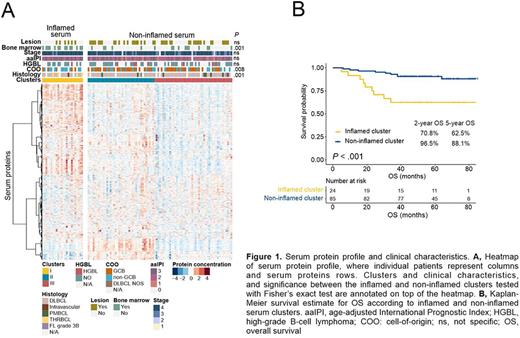Abstract
Introduction Large B-cell lymphomas (LBCL) constitute a group of aggressive B-cell lymphomas, which have striking genetic heterogeneity, variable tumor microenvironment (TME), clinical presentation and treatment outcome. Although LBCL patients are treated with a curative intent, their survival is suboptimal, and the current prognostic tool, the International Prognostic Index (IPI), cannot capture the biological heterogeneity of the disease. We studied serum proteome in a uniformly treated cohort of the patients with LBCL to characterize host response to lymphoma and to identify clinically relevant circulating proteins.
Materials and methods We applied proximity extension assay of 1463 proteins (Olink Proteomics) to pretherapeutic serum samples of 109 patients with primary LBCL and five healthy volunteers. The LBCL patients included in the study were 21-65 years of age and had clinically high-risk disease (age adjusted IPI ≥ 2) and/or site-specific risk factors for central nervous system (CNS) progression. Patients were treated in a Nordic phase II protocol with a dose-dense immunochemotherapy and early CNS prophylaxis. The findings from the serum proteome profiling were correlated with clinical and molecular data (gene expression, n = 48; multiplex immunohistochemistry, n = 39) from tumor tissue and circulating tumor DNA (ctDNA) from concurrent plasma samples (n = 91).
Results Unsupervised analysis of the pre-treatment serum protein levels revealed a subgroup of patients (n=24, 22%) with a distinct protein profile compared to the other patients and healthy volunteers (Figure 1A). The patients with this profile had elevated levels of inflammatory proteins, such as interferon gamma (IFNg) related T-cell response markers. Clinically, the patients with the inflamed serum protein profile had more often B-symptoms and lymphoma infiltration in the bone marrow, and dismal survival as compared to the patients with the non-inflamed profile (overall survival, HR 4.31, 95%-CI 1.71-10.88, P < .01, Figure 1B). In addition, T-cell/histiocyte rich large B-cell lymphoma and activated B-cell (ABC) molecular subtype were more common entities in these patients. Lymphomas in the inflamed serum cohort were characterized by a higher proportion of tumor-infiltrating T-lymphocytes and macrophages expressing immune checkpoint molecules, such as programmed death-ligand 1 (PD-L1), T-cell immunoglobulin mucin-3 (TIM3) and lymphocyte-activation gene 3 (LAG3). In liquid biopsy, a striking association between the inflamed serum protein profile and high plasma ctDNA levels was discovered (P < .0001). However, the profile associated with poor outcome independently of ctDNA levels (P < .01). Integrative analysis of ctDNA and serum proteins revealed synergistic potential for tumor profiling that extended beyond inflammatory markers. For example, circulating protein levels of tumor protein 53 (TP53) associated with p53 mutations, TP53 expression in the lymphoma tissue and high tumor burden. Moreover, high levels of serpin family A member 9 (SERPINA9) and TNF receptor superfamily member 13B (TNFRSF13B) characterized germinal center B-cell like/EZB and ABC/MCD diffuse large B-cell lymphomas, respectively.
Conclusions Our findings reveal an inflamed serum protein profile, which reflects host response to lymphoma, correlates with TME features, extends beyond ctDNA characteristics, and translates to poor outcome. Moreover, by integrating serum protein and plasma ctDNA profiling we uncover new associations that broaden the opportunities of liquid biopsies in LBCL. Together, our data establish a novel interaction between lymphoma and the host.
Disclosures
Holte:Novartis: Honoraria, Other: Advisory board; Genmab: Honoraria, Other: Safety committee; Gilead: Honoraria, Other: Advisory board; Nordic Nanovector: Honoraria, Other: Safety committee; Takeda: Honoraria, Other: Advisory board; Incyte: Honoraria, Other: Advisory board. Jørgensen:Gilead: Consultancy; Roche: Consultancy; Novartis: Consultancy; BMS: Consultancy; Orion Pharma: Consultancy; Incyte: Consultancy. Jerkeman:Novartis: Honoraria; Orion: Honoraria; Incyte: Honoraria; Kite/Gilead: Consultancy, Honoraria, Research Funding; Genmab: Honoraria; AstraZeneca: Honoraria, Research Funding; Roche: Honoraria, Research Funding; Janssen: Honoraria, Research Funding; BMS: Honoraria, Research Funding; Abbvie: Honoraria, Research Funding. Björkholm:Roche: Other: Advisory function; BMS/Celgene: Other: Advisory function; Janssen: Other: Advisory function; Astra Zeneca: Other: Advisory function; Incyte: Other: Advisory function; Mundipharma: Other: Advisory function; WntResearch: Other: Advisory function; Nanexa: Other: Advisory function; Schain Research: Other: Advisory function. Leppa:Beigene: Consultancy; Pfizer: Consultancy; Orion Pharma: Consultancy; Bayer: Research Funding; BMS: Consultancy, Research Funding; Gilead Sciences: Consultancy, Honoraria; Incyte: Consultancy, Honoraria; Novartis: Consultancy, Honoraria, Research Funding; Roche: Consultancy, Research Funding; Genmab: Research Funding; Nordic Nanovector: Research Funding.
Author notes
Asterisk with author names denotes non-ASH members.


This feature is available to Subscribers Only
Sign In or Create an Account Close Modal